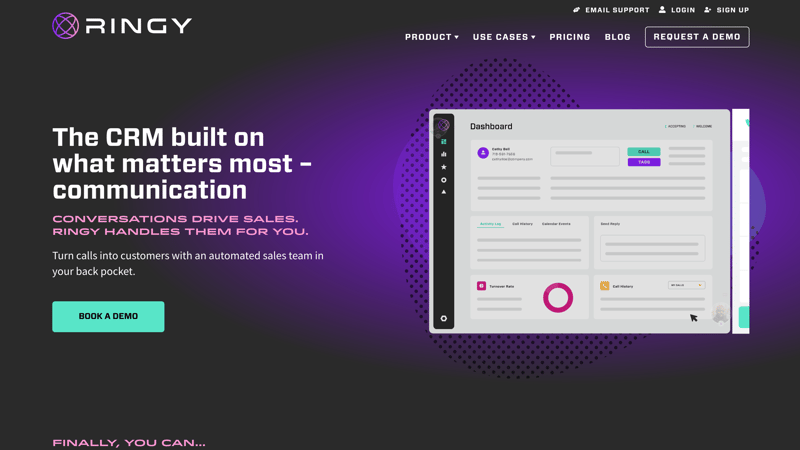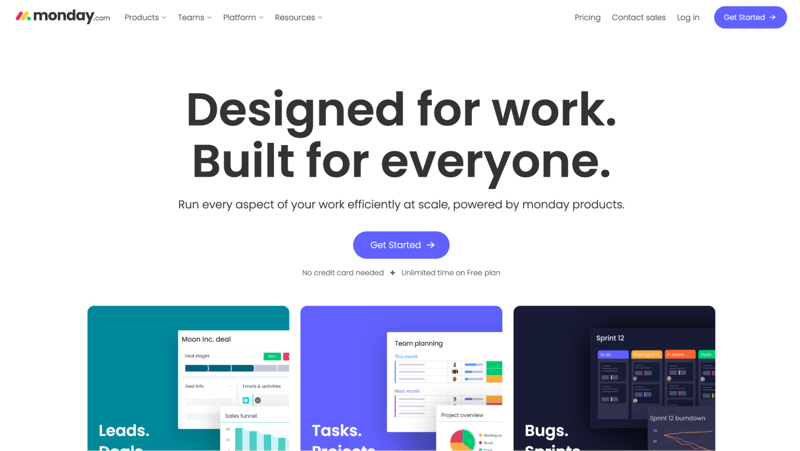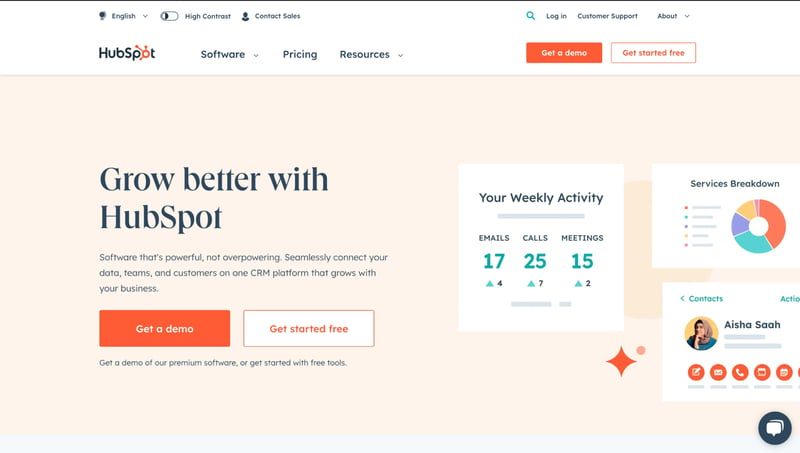
Choosing a Simple CRM Over a Complex One: Pros and Cons
 Updated on
Updated on
 By Bradley Kovacs
By Bradley Kovacs
Bradley Kovacs
Bradley has been passionate about technology since childhood, starting with Microsoft Flight Simulator at age six. In college, he automated his data e...
learn more
Bradley Kovacs
Bradley has been passionate about technology since childhood, starting with Microsoft Flight Simulator at age six. In college, he automated his data e...
Table of Contents
Table of Contents
Customer relationship management (CRM) is like a magical tool companies use to tame unruly data, cultivate consumer connections, and make sales dreams come true.
Picture this: you're running a business, juggling tasks left and right, and suddenly you hear whispers about a "simple CRM." The words "basic CRM," "easiest CRM," and "simple sales CRM" dance in your mind like a catchy tune you can't get rid of. Curiosity piques, and you wonder, "What is the easiest crm to use? Could this be the CRM solution I've been searching for?"
This article aims to teach you everywhere you're yet to learn about simple CRM software and why it should be utilized in your organization.
Here's what's to come:
- What is a simple CRM, and how does it differ from its complex counterparts?
- If a simple CRM is the correct fit for your business
- Discover the benefits of opting for a simple CRM system
- Explore simple CRM tools that empower companies without overwhelming them
- Learn how to choose a simple sales CRM
- Find the easiest CRMs to use and learn why their simplicity reigns supreme
So grab a water, coffee, energy drink, or favorite soda and explore simple CRM software—it's guaranteed to make even your spreadsheets crack a smile.
Why Using a CRM Is Important

Customer relationship management software assists marketing teams in locating new clients and prospects faster. A simple CRM's innovative user interface disentangles the intelligent storing and managing of customer data.
Sales teams use consumer data such as age, birthday, favorite color, demographic or previous purchases to tailor deals for specific clients.
This section examines the reasons why simple CRM systems is crucial for your business.
Helps You Keep Track of Customer Accounts and Sales
If you’re struggling to build ideal customer profiles (ICP) or locate client data points, it may be time to consider a simple CRM platform. When organizations reach the stage of expeditious expansion, a few valuable leads inevitably slip through the cracks.
But with an all-in-one simple CRM solution like Ringy, customer interaction data is extracted and stored to eliminate friction between identifying, qualifying, and converting leads. Your business will be able to adopt a more customer-centric approach with the implementation of a simple CRM system.
The software helps you track the following customer account information:
- Contact details (name, address, email, phone number)
- Job title or role
- Organization or company information
- Demographic data (age, gender, etc.)
- Preferences and interests
- Social media interactions and engagement
- Communication history (calls, SMS, email, live chat, etc.)
With all this data organized and centralized, you’ll have a comprehensive view of all customers so that your sales team can deliver a personalized experience customized precisely to how the audience wants it.
Here are some of the sales data tracked by simple CRM platforms:
- Lead or prospect source acquisition details
- Sales pipeline stages and progress
- Order history and status
- Sales performance insights and reports
- Revenue generated from each customer or account
- Quotes and proposals
- Support and service requests
This information allows an organization to optimize its sales processes, forecast future performance, and make intelligent data-driven decisions. You can also identify trends and analyze win/loss factors to continuously improve marketing strategies and customer experiences.
Helps Keep Customer Data Clean and Accurate
Maintaining complete data is essential if you want your simple CRM endeavors to succeed. However, keeping customer data clean and accurate requires a standard operating procedure (SOP) to support data entry across the organization.
Create written guidelines and make them available to all staff who access the customer relationship management system. The goal is to standardize how data is entered into the simple CRM software, as two entries can look entirely different to the platform—”AT&T” and “American Telephone and Telegraph Company.”
With reliable and up-to-date information, you can confidently base your strategies on accurate customer profiles.
Allows Alignment Between Different Departments
The success of an organization depends on cross-team alignment. Aligning your sales, marketing, and support teams instigates colloquial communication and helps employees get on the same page.
However, the alignment between the marketing and sales team is often the most imperative because it helps each department streamline subsequent phases of the purchaser’s journey.
Over 40% of sales employees stated that the amalgamation of sales and marketing divisions would become more imperative for them in 2023, with over 70% saying that customer relationship management software has significantly improved this alignment.
Allows for Forecasting and Reporting
Wouldn't it be nice to know the number of sales you would close next month? You can utilize a simple CRM to generate reports and dashboards with KPIs and metrics to make data-informed decisions about future sales.
Businesses can extract the following forecasting and reporting information from simple CRM systems:
- Customer satisfaction score
- The average revenue per client
- Lead conversion rate
- Customer retention rate
- Total sales revenue
Besides these metrics, end users can also forecast future sales based on historical trends and data. Leveraging a simple CRM platform is the best way to stay on top of things and plan for company growth.
Pros and Cons: Simple CRM versus Complex CRM

Finding and implementing the correct CRM software doesn’t require valuable employee time and business resources. Whether it’s the simplest CRM software or the most complex, this section covers both to give you a better understanding.
Simple CRM
Ease of use, essential functionalities, and streamlined workflows are the core elements of a simple CRM platform. This approach to managing customer relationships through automation, client nurturing, and team delegation helps businesses stay ahead.
Key features of a simple CRM system include contact management, basic sales tracking, employee and customer communication tools, and quick implementation. A simple CRM concentrates on providing core functionalities with a user-friendly interface and an easier CRM adoption procedure.
It offers essential features for effective customer management without overwhelming complexity.
Complex CRM
With the advanced functionality offered by complex CRM software, you can take care of your organization's every need. Features from comprehensive reporting, sophisticated customization topics, and in-depth analytics help companies grow and scale to the next level.
Compared to simple CRM platforms, these systems have more features, customizations, and integrations.
However, that is where things get complicated (excuse the pun.)
Smaller organizations or those with more straightforward CRM requirements may find the extensive functions of complex CRMs overwhelming or unnecessary, leading to an underutilization of the system. That's why it's imperative to determine your business's unique needs before deciding what type of customer relationship management tool will work best for your company.
Let's look at a table comparing the pros and cons of complex and simple CRM software.
|
Simple CRM |
Complex CRM |
|
|
Pros |
Easy to use and navigate |
Extensive feature set |
|
Quick implementation |
Advanced customization capabilities |
|
|
Cost-effective for small businesses |
Scalability for growing businesses |
|
|
Minimal training required |
Enhanced data analysis and reporting |
|
|
Cons |
Limited features and capabilities |
Steeper learning curve |
|
Less customization options |
Longer implementation time |
|
|
Not suitable for large enterprises |
Higher costs |
|
|
Basic reporting and analytics |
Requires dedicated IT resources |
|
|
Potential complexity for smaller teams |
A simple CRM system is an excellent fit for small businesses seeking a straightforward solution that emphasizes ease of use and swift implementation, all while being cost-effective. It caters to their essential needs without overwhelming them with unnecessary complexities.
In contrast, a complex CRM system is designed to meet the demands of larger enterprises with intricate sales processes and extensive data analysis requirements. It offers a comprehensive array of features and customization options, albeit at the trade-off of a more challenging learning curve.
What Are the Benefits of a Simple CRM?

Regarding customer relationship management, locating the correct CRM solution can make all the difference for organizations of all sizes. While complex CRM systems have their merits, there's something truly remarkable about the simplicity and charm of a simple CRM platform.
This section deals with the benefits that simple CRM software brings to the table. From cost-effectiveness to streamline features, easy onboarding to a user-friendly experience, let's explore how a simple CRM can be the game changer you're waiting for.
More Cost Effective than Complex Systems
Implementing and maintaining a CRM system can be a significant investment for companies, especially for smaller ones with limited resources. However, a simple CRM platform (like Ringy) offers a budget-friendly monthly subscription that won’t break the bank and can be canceled anytime.
Simple CRM software concentrates on providing basic functionalities at a lower cost, making it an ideal choice for small and medium-sized businesses with limited resources. It assists in accomplishing effective customer relationship management without straining your budget (and who likes taking a financial knock?)
Moreover, the automation and streamlining of workflows within the simple CRM platform will save you many man-hours, further increasing productivity while eliminating tedious, mundane tasks.
Doesn’t Overwhelm With Unneeded Features
Complexity can be time-consuming and arduous, so a simple CRM stands out with its streamlined features. Unlike enterprise-level CRM software that bombards users with many functionalities, a simple CRM focuses on providing core features that are easy to control and utilize.
A must-have feature of a simple CRM platform is integration with email services. Regardless of if it's Outlook or Gmail, the simple CRM software must connect with these apps to increase operational efficiency and customer interaction data recording.
By eliminating the distraction caused by unnecessary features, simple CRM software makes it easier to focus on what truly matters—communication and closing deals. The streamlined nature of a simple CRM system saves time, reduces complications, and maximizes customer relationships.
Easier to Onboard and Implement
An organized and preplanned onboarding process assists sales employees in understanding the advantages and value of the new simple CRM system. Once salespeople see how the platform works and how it can improve results and simplify their daily tasks, they're more likely to adopt and utilize it.
A simple CRM's user-friendly interface and intuitive design make it easier for teams to start quickly. With a simple CRM, the organization seamlessly integrates the system into its existing tech stack and workflows without significant disruptions.
The reduced learning curve ensures a faster adoption rate, enabling the business to harness the simple CRM software's capabilities to minimize downtime and maximize its team's productivity.
Easier to Use
In a world filled with complex systems, a simple CRM shines with its user-friendly experience. An innovative and straightforward navigation system empowers users to adapt quickly to the platform with minimal training.
This ease of use encourages teams to leverage the simple CRM's functionalities and concentrate on building meaningful customer relationships with these tools. The user-friendly experience of a simple CRM platform enhances engagement, encouraging teams to actively utilize the system leading to increase productivity and better customer experiences.
Scalability and Flexibility
As businesses grow and evolve, their customer relationship management needs naturally advance. This is where a simple CRM platform's advantages of scalability and flexibility become invaluable.
While it may not boast all the advanced features of a complex system, a simple CRM platform can scale seamlessly alongside your company. It caters to increasing customer demands and expanding operations without burdening users with hard-to-use dashboards or unnecessary complications.
Through its adaptable nature, a simple CRM empowers businesses to adjust and customize their CRM activities according to evolving requirements, thus enabling them to thrive in the dynamic and ever-changing marketplace.
Here's a table showcasing the features and benefits of a simple CRM system:
|
Feature/Benefit |
Simple CRM |
|
Ability to Scale |
|
|
Flexibility and Customization |
|
|
Complexity Management |
|
|
Adaptation to Market Dynamics |
|
With a simple CRM as their foundation, businesses can confidently navigate the path to success, knowing that their CRM system will remain adaptable and responsive to their evolving needs.
How to Choose a Simple Sales CRM

Selecting the right simple sales CRM is crucial for any business aiming to optimize its sales processes and enhance client relationships. However, navigating the landscape of available options requires a thoughtful approach that considers a few key factors.
Let's unravel how to choose a simple CRM that perfectly aligns with your company's needs and empowers sales strategies to foster long-lasting customer relationships.
Ease of Use
When choosing a simple sales CRM, prioritizing ease of use is paramount. Look for a system with an intuitive dashboard and straightforward navigation that minimizes your team's time to get to grips with the platform.
A user-friendly control panel offers these three advantages:
- Quick adoption
- Maximized productivity
- Reduced training costs
Evaluate trial versions and demos to gauge the simple CRM platform's usability and seek feedback from other users to make a wise decision.
Flexibility
Flexibility in customization and workflow configurations must be the epic center of a simple CRM system. Solutions that can be tailored to match your specific requirements and sales processes are essential for growing businesses.
Ask questions such as:
- Can the simple CRM grow alongside my business?
- Does it accommodate changing workflow?
- Can it be used to evolve my customer relationship management strategy?
It would help if you also looked for a simple CRM to create custom fields, stages, pipelines, and workflows. A flexible CRM should be able to integrate with other tools and vendors you use, including marketing software, accounting, social media, Google Calendar, and email accounts.
Cost
Of course, cost is always a factor when choosing a simple CRM. You want a CRM that fits your budget. Most simple CRM software offers value-for-money services with transparent and affordable pricing plans without long-term contracts or hidden costs.
Consider the cost of a simple sales CRM and weigh it against your budget and expected return on investment. Evaluate upfront and ongoing expenses, such as subscription fees and additional features or add-on fees.
It's a best practice to compare the pricing plans of different CRM providers to ensure the chosen system aligns with your business size and requirements without compromising on essential functionalities.
Ease of Implementation and Onboarding
Another factor to consider is how easy it is to implement and onboard the CRM in your business. You don't want a CRM that requires a lot of technical expertise or support to set up and run. You want a CRM ready to use out of the box, with minimal configuration and customization required.
Search for a simple CRM system with the following criteria:
- User-friendly setup wizards
- Clear documentation
- Readily available support resources and training materials
- Onboarding assistance to facilitate a seamless transition
Assess the technical expertise required for initial setup and ongoing maintenance to ensure a hassle-free experience.
Integration with Existing Tech Stack
Integration capabilities are vital when selecting a simple CRM platform. Gauge whether the simple CRM system seamlessly integrates with your existing tech stack, including email clients, productivity tools, marketing automation software, and other relevant vendors, services, or platforms.
A well-integrated, simple CRM system enables smooth data flow, eliminates manual data entry, and provides a comprehensive view of customer interactions across various touchpoints. This integration gives sales teams accurate and updated information, streamlines workflow, and facilities data-driven decisions making, outlining and enhancing overall sales performance.
A simple sales CRM should also have an open API to connect it with any other applications or services you need.
Customer Support
The final factor to consider is the customer support of the simple sales CRM platform. You want a tool that has a reliable and responsive client service team who can assist you with any questions or issues you may encounter.
A simple CRM should offer multiple communication channels, such as a ticket system, live chat, email, phone, and text. Searching for a tool with a comprehensive knowledge base, FAQs sections, or community forum can help you locate solutions and answers faster.
3 Best Simple CRM Solutions
Businesses use intuitive CRM solutions with key features and augmented workflows to simplify and optimize crucial operational areas.
Discover how our top solutions can elevate your sales processes, enhance productivity, and foster lasting customer relationships, leading you toward organizational growth and success.
Ringy

Our solution is a simple CRM system that concentrates on phone-based sales. Ringy lets you make and receive VoIP calls from your browser or mobile app while recording and transcribing conversations. Track call outcomes and follow up with leads and customers.
It also integrates with popular tools like Gmail, Outlook, Zapier, and Slack.
Ringy’s pricing starts at $119 per month and includes many features to get you started on the customer relationship management journey.
Functionalities such as a predicate and power dialer, call transfers, advanced CRM features, and a free trial make it a no-brainer to try out our platform.
Monday.com

Monday.com is a simple CRM solution that doubles as a project management tool. It allows you to create customizable workflows for different sales process stages, track and update your deals in real-time, collaborate with your team members, and automate tasks and reminders.
This CRM boasts over 200+ templates, 20 column types, a mobile simple CRM app, cloud storage integration, and 24/7 customer support. Lead tracking, deal pipelines, task management, and reporting tools are just a few features offered by Monday.com's user-friendly platform.
By harnessing the power of Monday.com, businesses can foster improved team collaboration, enhance sales efficiency, and drive sustainable revenue growth.
HubSpot

This platform offers a range of features for sales, marketing, and customer service requirements. HubSpot is free for unlimited users and contacts and includes tools like contact management, email tracking, live chat, meeting scheduling, and deal tracking.
You can also upgrade to paid plans to access more advanced features like email marketing, automation, reporting, and analytics.
With its user-friendly interface and seamless integration with other HubSpot marketing and sales tools, businesses can leverage HubSpot as a comprehensive all-in-one solution for their CRM needs.
Simple CRM - Final Thoughts
We hope you enjoyed reading this article about simple CRM and how it can help you streamline your sales process, improve customer relationships, and grow your business. Simple CRM software is not just a buzzword; it's a powerful tool that can make a massive difference in your organization.
But not all simple CRM solutions are created equal.
Some are too basic, some are too complex, and some are expensive. We recommend Ringy, the best simple CRM for growing organizations. Ringy is easy to use, affordable, and scalable. It has everything you need to manage your contacts, leads, deals, tasks, and more. Plus, it integrates with your favorite apps and tools to work smarter and faster.
If you want to see how Ringy can help you achieve your sales goals, request a demo today. No credit card is required, and no strings attached.

Skyrocket your sales with the CRM that does it all.
Calling? Check. SMS? Check. Automation and AI? Check. Effortlessly keep in touch with your customers and boost your revenue without limits.

Take your sales to new heights with Ringy.
Sales in a slump? Ringy gives you the tools and flexibility you need to capture leads, engage with them, and turn them into customers.
Subscribe to Our Blog
Enter your email to get the latest updates sent straight to your inbox!
Categories
Related Articles




































































































